The visit
Before childcare entry, a first meeting is scheduled with a member of the Management Team, who presents the institution, regulation and educational approach to the parents.
Pedagogy
Educational Project
The educational project reflects the institution's values. It sets the educational approach and methods used as well as a general framework and points of reference to which every professional can refer. This document explains the duties of the people who work within the Myosotis Foundation child care centers, as well as their roles and purpose. The Team's main objective is to take responsibility for each child’s needs and rhythm, while awakening kids to interactions with others and community life.
The visit
Before childcare entry, a first meeting is scheduled with a member of the Management Team, who presents the institution, regulation and educational approach to the parents.
The educational
meeting
A few weeks before childcare entry, a second appointment is organized with the Team Leader and the Reference Educator in order to address questions from the family and take note of the child’s needs and habits. Administrative and organizational topics can also be brought.

The integration program
Integration is a period from 5 to 10 days during which the child attends the childcare progressively during the different key moments of the day. The integration program is defined during the educational meeting, lasting two weeks in Nurseries and Toddlers groups, and one week in the Preschool groups. This program is adapted to the child’s needs and takes into account parents’ availabilities and the organization of the educational team.
The contract starts on the 1st day of integration.
Example:
1st day: 1 hour with one of the parents
2nd day: 45 minutes-1h30 without the parents
From the 3rd day until the first full day of attendance: gradual increase in time spent in the group.
Childcare entry
On the first day, the child joins the group for one hour. The parent is invited to stay in the room for a while and then can leave for a moment, depending on child’s needs and the feelings of the parent. The rest of the integration is to be agreed between the referent and the family according to the rhythm of the child and the possibilities of the group.
Several objectives are targeted during this period:
The role of the Reference Educator
The Reference Educator is the first person from the educational team that the child meets and with whom a reassuring bond is created during the first days. The Educator will offer parents a review interview after approximately 3 months of attendance, then a second before the change of sector. At any time, parents can request a meeting in order to discuss the child’s care, development or a particular topic.
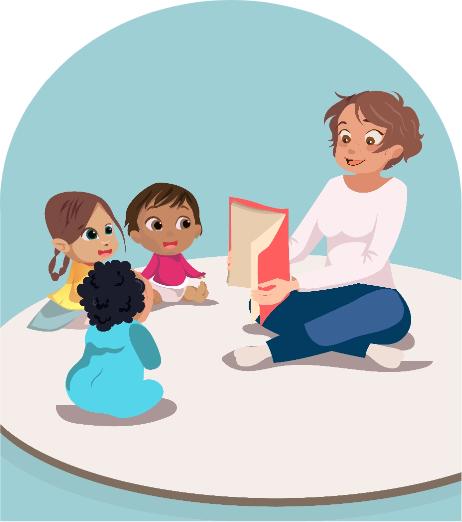
Sector changes
Children are accommodated in the different groups according to their age. Sector changes are planned twice a year, depending on the groups’ availabilities.
The Team Leader personally informs the parents of the date on which the child will change sector. A meeting with the new team is organized in order to visit the new sector and to answer any questions relating to this transition.
Tailored meals
For the children, meals go with multiple discoveries: flavors, smells, colors, conviviality. Each family’s culture is taken into account as much as possible. Requests are assessed depending on their nature (for example: no-pork diet).
Depending on the child’s age, meals are taken under different conditions. The little ones are fed on request in a calm and reassuring place. Their individual rhythm is taken into account. Children that are not autonomous while seated are fed in the educator’s arms, which enable them to share a privileged moment with the adult. The older children from the Nurseries, as well as the Toddlers and Preschoolers have their meals in group, accompanied by the educational staff on every occasion.
Rooms for mothers wishing to breastfeed on site are also provided.
Meals
preparation
Meals are prepared on site by our chef and his Eldora team. The “Fourchette verte” label (Green fork) for young children aims to favor healthy and balanced food, and guarantees the intake of essential nutrients throughout the day. New food is introduced at home until the age of one. The parents communicate necessary information to the team, so that we are able to adapt the meal’s configuration (food, mixed, unmixed, allergy - if medical certificate).
The childcare has been certified "Fourchette verte"
Free play
It is important to leave enough space to free and spontaneous play. The child has also the right to do nothing, to dream. The educational team is attentive to individual needs.
Free play gives children the opportunity to develop their sensoriality and to take initiatives. Children explore their senses, develop their language, creativity and motor skills. They experiment relationships with their peers. Through this kind of play, they can also express their emotions and show what worries them or what they are feeling in all ranges of negative and positive emotions.
Guided activities
Guided activities are frequently offered by the educational team. Through various workshops (painting, craft making, drawing, etc.) and at their own rhythm, children exercise their ability to express themselves according to their desires and needs.
On the other side, manual, sensory and creative activities are intended to develop their five senses: sight, hearing, smell, touch and taste.
The child care center has educational and pedagogical material adapted to children’s age and needs (puzzles, shapes games, board games, motor skills equipment, etc.). The educational team balances free play with directed activities, so that children can have as varied experiences as possible.
The childcare has been certified "Eco-Schools" and "Youp'là bouge"
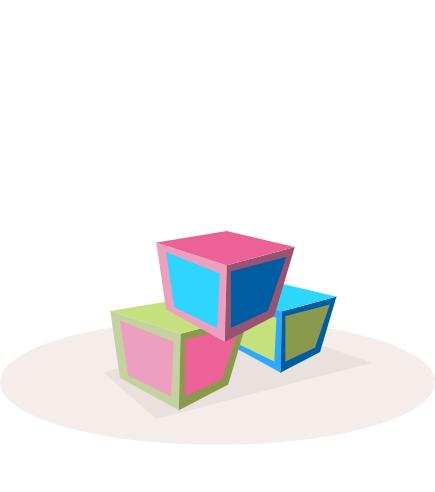
Psychomotor activities
These activities (psychomotor trails, gym, yoga, rounds, etc.) stimulate motor development. They promote awareness of body image, make the children aware of their own body and help them to better understand how to locate themselves in space.
We offer stimulating premises that promote movement. The educational team supports the children in their learning process, which gives them the opportunity to take risks according to their abilities and to surpass themselves. Children evolve at their own rhythm in a progressive and continuous way.
Children sharpen their motor skills on a daily basis: during free play, guided activities, meals and throughout the day.
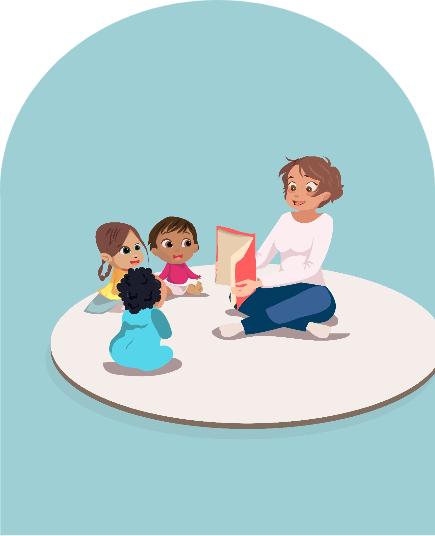
Animation moments or “welcome time”
Welcome times are moments during which children gather and are invited to express themselves and listen to each other. Singing, dancing, rhymes and other stories are an integral part of the animation, sometimes linked to a specific topic.
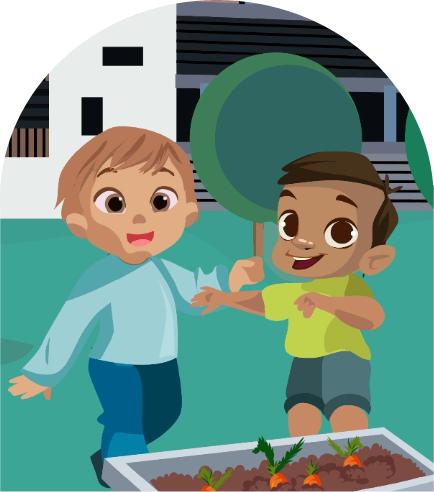
Outings
Outdoor activities are proper times to observe the environment, exercise and develop physical skills. It is an opportunity to let off steam: run, shout, jump, ride a bike, climb, etc. They also allow us to raise awareness among children of ecology. In case of special outings, parents are sometimes invited to share a recreational and friendly moment.
Discovering books
Books can be discovered with the adult, between children but also independently. Children participate in the way they want (at a distance, by playing, by always looking at the same book), so that they can positively apprehend this object and familiarize themselves with it. We are faithful to the text, indeed we pay attention to learning new words and raise awareness of different storytelling types, among other things.
Books have many benefits for children. Telling stories encourages the development of language, five senses, curiosity, imagination, as well as creativity. It is a fun way to approach various themes through traditional tales, stories, picture and sensory books.
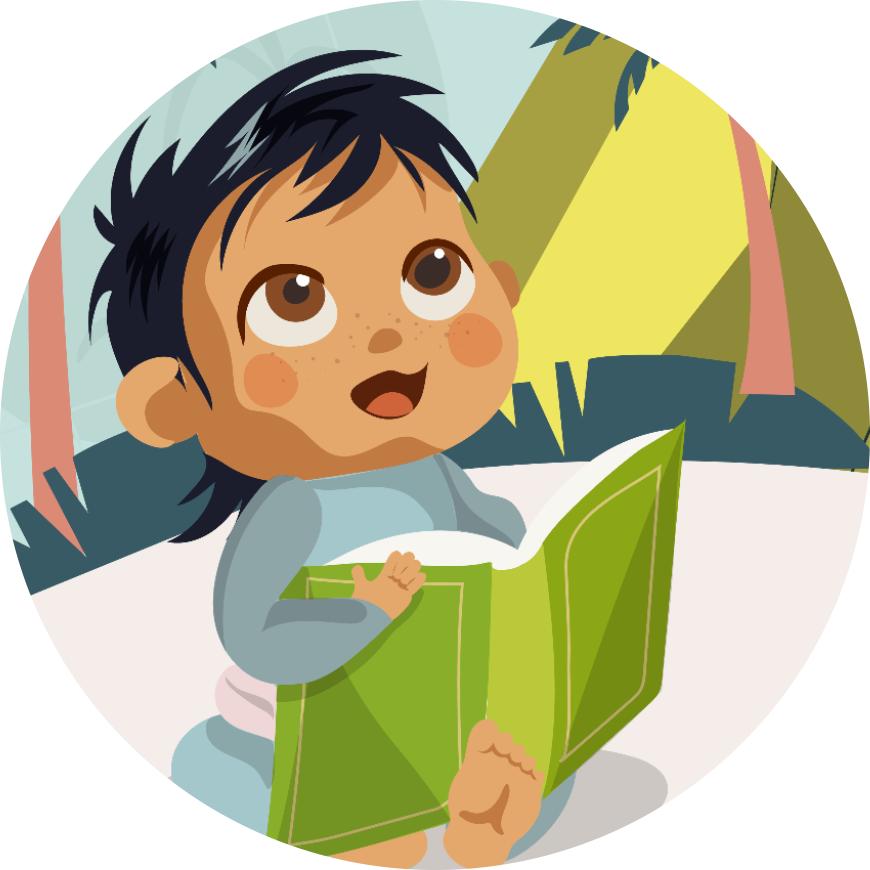
Groups
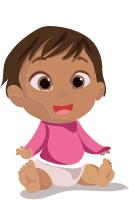
Nurseries
Children from 3 to 24 months
2 groups of 20 children
Accommodation adapted to your child’s needs and rhythm
Tight collaboration with families
A diet that evolves based on your child’s development
Activities that allow discovery

Toddlers
Children from 18 to 36 months
2 groups of 21 children
Activities and outings that promote motor skills, cognitive and sensory development
Games and group dynamics that encourage socialization and language learning
A support in the recognition of emotions
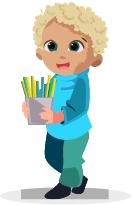
Preschoolers
Children from 3 to 4 years old
2 groups of 20 children
Activities focused on collaboration, sharing and exchange with peers
Stimulating outings
Learning cleanliness and hygiene practices
Support for autonomy